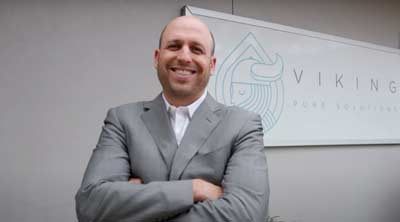
Contributed by Joshua Schwartz, President & Co-Founder of Viking Pure
As summer approaches and country and beach clubs gear up to welcome an influx of visitors, it is important to prioritize eco-friendly cleaning practices that minimize harm to the environment and protect the health of club members and employees. By adopting effective and sustainable cleaning protocols, country clubs and beach clubs can strike a balance between hygiene and environmental responsibility.
Here are some ways that clubs can demonstrate their commitment to their members by creating a safe, sanitary and fun environment this summer:
Establish Clear Cleaning Protocols
The first step in ensuring effective and eco-friendly cleaning is to establish clear protocols and guidelines for staff to follow. This includes specifying the frequency and scope of cleaning tasks, as well as identifying the appropriate cleaning agents to use. By having well-defined protocols in place, staff members will have a consistent framework to adhere to, minimizing the chances of oversight or negligence.
Choose Environmentally-Friendly Cleaning Products
Traditional cleaning products often contain harsh chemicals that can be harmful to both human health and the environment. To mitigate this, country and beach clubs can transition to eco-friendly cleaning products that are biodegradable, non-toxic, and derived from sustainable sources. Look for certifications such as Green Seal or EcoLogo to ensure the products meet rigorous environmental standards.
Electrolyzed water is a new cleaning technology that allows clubs and other recreational facilities to produce safe, sustainable cleaning and disinfecting solutions on-site and on-demand. Made with just water, salt, and electricity, there are no additives, allergens, or toxic chemicals in these solutions, and they are also Green Seal certified and organic.
Embrace Microfiber Technology
Microfiber cleaning materials have gained popularity due to their exceptional cleaning capabilities and eco-friendliness. These synthetic fibers are highly effective at trapping dirt, dust, and bacteria without the need for harsh chemicals. Microfiber cloths and mops can be washed and reused multiple times, reducing waste and minimizing the environmental impact of disposable cleaning materials.
Implement Safe Disinfection Practices
While cleaning removes dirt and debris, disinfection is essential for killing viruses and bacteria. However, many conventional disinfectants contain harmful chemicals such as bleach, quaternary ammonium compounds, or ammonia. Consider switching to environmentally friendly disinfectants that are equally effective in killing pathogens but have lower toxicity and environmental impact. Look for disinfectants that are EPA-registered and list zero hazards on their safety data sheets. Hypochlorous acid, an electrolyzed water disinfectant, checks all of these boxes.
Promote Hand Hygiene
Hand hygiene is crucial in preventing the spread of viruses and bacteria. Provide ample hand sanitizing stations throughout the facility, especially in high-traffic areas such as entrances, restrooms, and dining areas. Additionally, educate staff and patrons about proper handwashing techniques, emphasizing the importance of thorough hand washing for at least 20 seconds.
Enhance Ventilation and Air Quality
Good ventilation plays a vital role in reducing the transmission of airborne pathogens. Ensure that ventilation systems are properly maintained, filters are regularly cleaned or replaced, and air circulation is optimized. Natural ventilation through open windows and doors can also help improve air quality. Consider installing air purifiers or related systems to further enhance indoor air quality.
Train and Educate Staff
Proper training is essential to ensure that cleaning staff understand the importance of effective and eco-friendly cleaning practices. Provide comprehensive training on cleaning protocols, proper use of cleaning agents, and safe handling of equipment. Keep staff informed about the latest advancements in eco-friendly cleaning technologies and products to encourage continuous improvement.
By prioritizing cleanliness and implementing effective and eco-friendly cleaning practices, country clubs and beach clubs can combat the spread of viruses and bacteria while safeguarding the health of staff and patrons. From establishing clear protocols and choosing environmentally friendly cleaning products to promoting hand hygiene and ensuring proper ventilation, every step taken toward a safer and greener environment contributes to a more sustainable and enjoyable summer experience.

Joshua is an active developer of medical real estate and supportive housing. Prior to Viking Pure, Schwartz was the president of an Article 28 Diagnostic and Treatment Center. He began his career in the financial industry, first in investment banking at Citigroup and then at private equity firm Apollo Management. Josh graduated Phi Beta Kappa from Yale College with a B.A. in Economics with Distinction and holds a master's from New York University, where he graduated with Honors.

 The Down and Dirty on Cleaning in Virus Season
The Down and Dirty on Cleaning in Virus Season How Surfactant Use is Expanding in Commercial Cleaning
How Surfactant Use is Expanding in Commercial Cleaning Clean Buildings Conference
Clean Buildings Conference